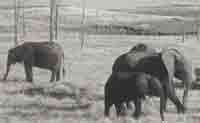Problems of solutions
 efforts to introduce a birth control pill in elephants have been suspended in South Africa after the normally orderly herds of the pachyderms were thrown into confusion. The new measures for population control in the overcrowded Kruger National Park are being tried out after the controversial culling of elephants was done away with last year. Before that, about 600 animals were being killed annually ( New Scientist , Vol 154, No 2084).
efforts to introduce a birth control pill in elephants have been suspended in South Africa after the normally orderly herds of the pachyderms were thrown into confusion. The new measures for population control in the overcrowded Kruger National Park are being tried out after the controversial culling of elephants was done away with last year. Before that, about 600 animals were being killed annually ( New Scientist , Vol 154, No 2084).
Slow-release oestrogen implants were placed inside 10 elephant cows in the park in October 1996 by a team of scientists from the Institute of Zoo Biology and Wildlife Research, Berlin. The oestrogen overload made the cows appear to be on heat permanently. This in turn encouraged the constant attention of the elephant bulls. "They were in a state of continual false oestrus, and the bulls would not leave them alone,' says Ian Whyte, elephant specialist at the park. "When we tracked them from the air, we would find a cow on her own surrounded by up to eight bulls. We do not want to treat the elephants in this way.'
The problems were not limited to this. New mothers had been selected for the trials by the scientists as they were less likely to get pregnant. The exited bulls, however, separated some cows from their calves. The researchers concede that problems with the use of oestrogen-only implants had been "suspected'. They, however, want to continue with their work using combinations of hormones. The administrators of the park say that though future trials have not been ruled out, any hormone combinations would have to be rigorously tested beforehand.
The dangers of implanting hormonal contraceptives in animals are well documented, says Jay Kirkpatrick, expert in wildlife contraception at ZooMontana, a zoological institute in Billings, Montana. Hormonal birth control for wildlife was abandoned by ZooMontana in the 1970s because of its impracticality and changes in behaviour that it produced, he says. Hormonal birth control has been shown to cause tumours in zoo animals. Moreover, it is a time-consuming and expensive exercise as the animals must be recaptured every six months for the implants to be replaced, adds Kirkpatrick.
Work on a separate immuno-contraception programme in the park has been undertaken by scientists from the University of Pretoria and ZooMontana. In this, elephant cows are vaccinated with protein taken from the layer of cells surrounding the ova of pigs. This stimulates the production of antibodies that block sperm from penetrating the elephant's own ova.
Related Content
- Interconnected disaster risks: Turning over a new leaf (2025 report)
- Finding the finance: a guide to identifying centrally sponsored schemes to fund heat resilience solutions
- Population management of species involved in human wildlife conflict
- Wastewater: turning problem to solution
- Roadmap for wildfire resilience: solutions for a paradigm shift
- What the future has in store: a new paradigm for water storage
